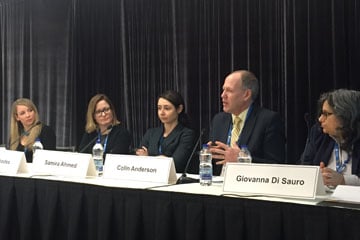
After the legalization of recreational cannabis in 2018, discrepancies remain with how the Cannabis Act addresses youths.

Three months after the legalization of recreational cannabis, discrepancies remain with how the Cannabis Act addresses youths.
During a panel discussion hosted by the Ontario Bar Association Wednesday, Emma Rhodes, panel lawyer for the office of the children’s lawyer at the Ministry of the Attorney General, said federal cannabis regulations are not only problematic for those under the age of 18 but may be considered unconstitutional under the Youth Criminal Justice Act.
The issues lie primarily in the differences between youth and adult sanctions for the possession of cannabis and cannabis plants. Under the federal act, adults face criminal liability for possession of more than 30 grams of cannabis, whereas youths are criminally liable for possession of more than five grams.
“That is, I would argue, illegal under the Youth Criminal Justice Act, because the Youth Criminal Justice Act says that a young person cannot face a higher sanction than an adult for the same offence,” Rhodes said. “Not only do they face a higher sanction, they also face criminality for something that adults cannot have criminality for.”
Differences also exist in the production of cannabis material, where adults are not permitted to have more than four cannabis plants and youths are not allowed any.
However, Rhodes doubts that there will be any constitutional challenges appearing in courts across the country.
“I think that federal Crowns know that it's not constitutional, and they know that it runs afoul of the YCJA,” Rhodes said. “I don't know a federal Crown that will prosecute. I think they will withdraw.”
Samira Ahmed, a litigation lawyer at Justice for Children and Youth, also sat as a panelist during the discussion.
She says not only does the federal act create a status offence with the dissimilarities between youth and adult consequences, there is also confusion in how charges for under-age cannabis possession or production will apply once the individual turns 18 years of age. According to Ahmed, a youth convicted of an offence under the YCJA can have their records turn into a criminal record after the age of 18, but that provision can result in an adult being sentenced for an offence that doesn’t exist for that age group in the first place.
Ahmed also says that the Cannabis Act has an ineffective approach to young people and is inconsistent with the YCJA because of a lack of limitations on the criminal justice system’s involvement.
The act was initially intended to promote the health of children in the face of cannabis legalization, but it has become focused on criminalization as opposed to rehabilitation and reintegration.
“There's no limit on the criminal justice system’s involvement, as we see that there's a more intrusive approach for young people,” Ahmed said. “The criminalization of cannabis use doesn't actually look at the underlying causes of the behaviour; it doesn't provide extra rights protections that are afforded to young people because they are inherently more vulnerable when faced with legal consequences.”
Provinces, however, are also subject to their own regulations surrounding the sale, distribution, purchase, possession, cultivation, propagation and harvest of cannabis, Rhodes said, and Ontario has decided to regulate cannabis as a Provincial Offences Act similar to traffic violations, alcohol and trespassing property offences.
Aimed at reducing the criminalization of young people for cannabis-related offences, under s.20(2) of the Ontario Cannabis Control Act, police have the discretion to withdraw charges and refer an arrested youth to education and prevention programs.
However, Rhodes suspects that this may be “disproportionately applied depending on the status of the young person, whether or not they’re racialized or poor.”
Schools are also in a position to be able to provide these supports to students, and Colin Anderson, system principal for Safe Schools in Ontario, says that he has been working closely with principals across the board to help them rethink cannabis as in alignment with alcohol.
Changes were made to the Education Act following the regulation of cannabis, which de-listed the substance as an illegal drug. Police, now, are no longer required to be notified when a student is found in possession of cannabis, and it is up to the discretion of school staff to notify police in situations where a student is caught “giving” cannabis to another individual, Anderson said.
“Our goal isn't to punish, it's to discipline, and the root of discipline is learning,” Anderson said. “Our goal is to connect those students with supports and stop recurrences of the same behaviour.”
Ahmed said there should be consideration for the risk of duplication of consequences when a youth may be facing both suspension or expulsion through the Education Act and a provincial or federal offence, especially for highly vulnerable youths that are overrepresented in both systems.
“There is this decision for police officers to be making in terms of whether they look at the situation that is occurring on school property from the provincial legislation's perspective or the federal legislation's criminal perspective,” Ahmed said, “and hoping that the provincial scheme is favoured, as opposed to the criminalization of the behaviour.”